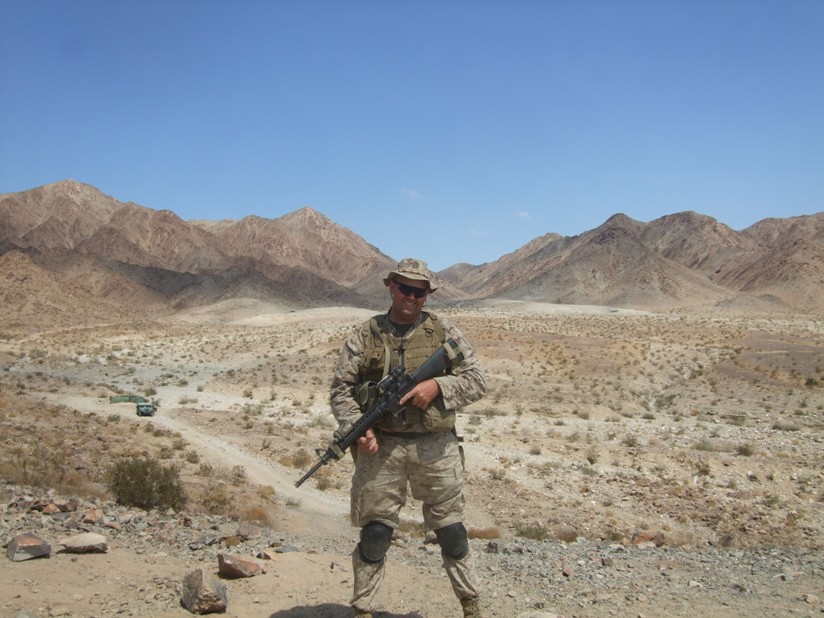That being said, while a lot of his works can resonate in places (look at Othello’s Iago sometime and tell me he's not the patron sinner of Blue Falcons everywhere), the following are what I consider to be his must-see trilogy for modern warfighters.
The Boot - Henry V.
This is the most popular, most quoted, and most often performed of the three, and there's reasons for that. This is the rousing, motivated war story of the bunch. Even if you've never seen it, I guarantee you've heard parts of it.
"For he to day that sheds his blood with me,
Shall be my brother"
Yep, this is where that came from.
There's some argument as to how much of a war story or anti-war story it is, and of course different productions will have differing foci. But what makes it so timeless for me as a warrior is that every character is someone you'll recognize. Fearless leader? Henry himself. All-business hardcore operator? Exeter. Ring knocker trying way too hard? York. Guys who wish they were back on the block? Bardolph, Nym, and Pistol. The boot too young to have a clue about war but not going to miss the most exciting thing he's ever heard of? The Boy. The hardest-hitting one for me is usually Mistress Quickly. It's easy to write her off as an annoying dependa, but if played well, her last scene will rip your heart out.
While it drags in places and the ending takes too long, it's packed with the excitement, dread, and even mundanity of fighting a war.
While seeing it live is your best option, there's a few filmed versions out there. My personal favorite is Kenneth Branagh's version from 1989, but as always, your mileage may vary.
The Terminal Lance - Troilus and Cressida
This is the wierdest and least performed of the three, and at first glance it's easy to see why. It's neither comedy nor tragedy as the literati consider it, but being neither fish nor fowl makes it even more appropriate for the terminal lance.
That said, the play has had something of a resurgence lately, and it's easy to see why. Set seven years into the Trojan War, the original reasons for the Greeks to attack are now meaningless, and the two armies have descended into boredom and, as any grunt knows, boredom heralds stupidity. More characters familiar to the warfighter appear: the perpetually belligerent shitbag (Thersites), the musclehead who's useless at anything other than combat and weightlifting (Ajax), moron officers (Agamemmnon, Meneleus), the one guy with his shit together but can't get anything done (Ulysses), the one guy who can't shut the hell up (Ulysses again), the guy who inexplicably drops his pack (Achilles), and the guy who's just trying to get the job done amid all the stupidity (Hector).
All this is set against what looks at first glance like a rehash of Romeo & Juliet, but has it's own problems. The show is riddled with mood whiplash between romance, sex farce, and war epic. Anyone who's ever had an in-depth conversation about their balls interrupted by a firefight can relate.
While Henry V is all about the glory and grit of fighting a war, Troilus is more about living in a war. Just because people are trying to kill each other professionally doesn't mean they stop falling in love, having problems, or living their lives. I wouldn't call it inspirational, but it's definitely resonant. Even something as simple as the Greek kings getting lost in the night trying to find Achilles' tent will be familiar to anyone who spent time among the seas of identical-looking Quonset huts at Bagram or Buehring.
Unfortunately, I don't know of any film adaptations. But like I said, GWOT has inspired a lot of theater companies to bring it out in the last couple of years.
The Veteran - Coriolanus.
Where Henry V is all about fighting a war, and Troilus & Cressida is the absurd tragedy that is trying to live your life in the middle of a war, Coriolanus looks at fighters who've replaced their fear of dying on the battlefield with the fear of what to do with their lives now that they've come home. What happens when you're a brilliant warrior whose country no longer wants you fighting for it? And whose populace, whom you've been wading in blood for, can seem to do nothing more than bitch about one thing or another?
Coriolanus is a Roman general, brilliant in the field, but allergic to ass kissing. After winning a major battle (but failing to kill his rival), Coriolanus is pushed into running for consul by his mother. While he has some success in the Senate, jealous rivals and politics in general kick in and chaos ensues.
It hits all the more home nowadays, where troop drawdowns are forcibly discharging a lot of talented fighters back into the civilian world, and veteran suicides remain high.
It's scary how easy it is to plug modern-day figures into various roles: Gen. McChrystal as Coriolanus himself, brought down in such a bullshit way he can barely be bothered to resist. Gen. Petraeus is Menenius, a respected leader but a goody two-shoes when near his contemporaries. And Gen. Mattis as Cominius, a memetic badass, but has nowhere near the power or skill in the political arena that he did in the military. The Tribunes, well, pick an obnoxiously anti-war politician, wielding that innocuously powerful weapon: a mob of useful idiots.
It's dark and not the easiest thing to see, but it tackles a lot of hard topics. Definitely deserves more time on the boards. Like Troilus, it's getting somewhat of a resurgence thanks to GWOT. There is at least one film adaptation that came out relatively recently, starring Ralph Finnes and Gerald Butler.



 RSS Feed
RSS Feed
